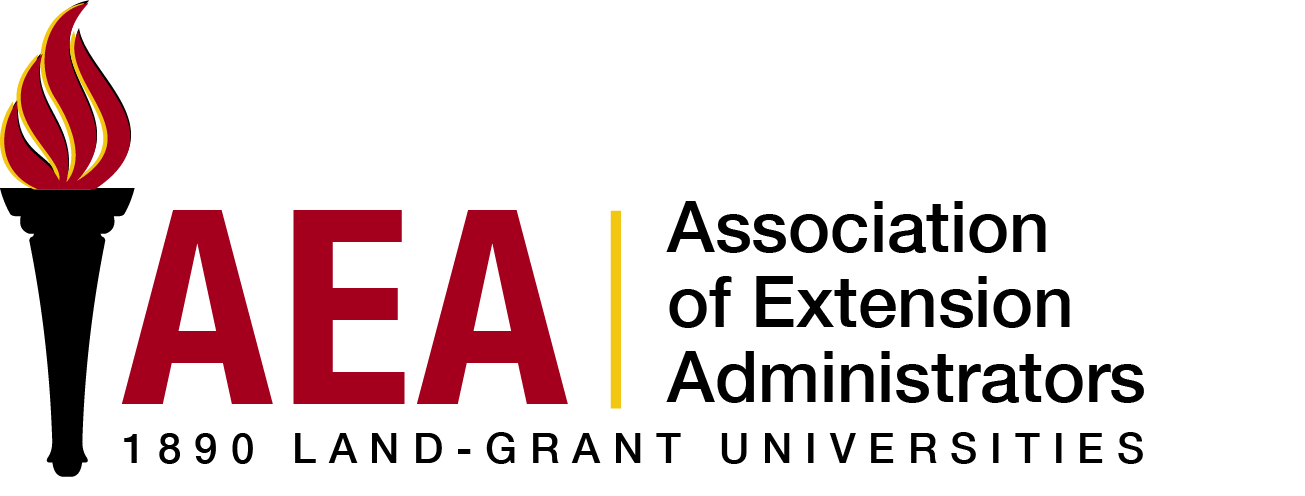Extension Today
News from and about the 1890 Land-Grant Extension SystemMessage from the Chair
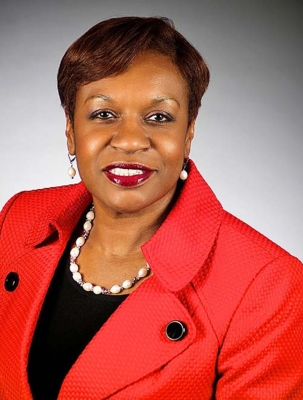
Dr. Carolyn Williams Executive Associate Director, Prairie View A&M University
The Cooperative Extension System (CES) empowers farmers, ranchers, youths and communities of all sizes to meet the challenges they face, adapt to changing technology, improve nutrition and food safety, prepare for and respond to emergencies and protect our environment.
Our main priority is taking knowledge gained through unbiased research and education and disseminating it directly to the people to create positive changes. This is accomplished through the work of local Extension agents, also known as Extension educators. Extension educators apply various modes of modern technology to expose knowledge and tools but also rely on traditional human values and relationships to gain the attention and trust of the people they serve. As residents of the communities where they work, Extension agents bring credibility to their roles as educators.
Enjoy this month’s edition of the AEA Extension Today newsletter, which features strategies and activities that ensure full access to participation in our programs. Access to information is one of the many ways Cooperative Extension works to increase equity, be responsible stewards of federal funds, address emerging issues and provide excellent customer service.
“Coming together is a beginning; keeping together is progress; working together is success.” - Henry Ford
Expanding outreach in Alabama
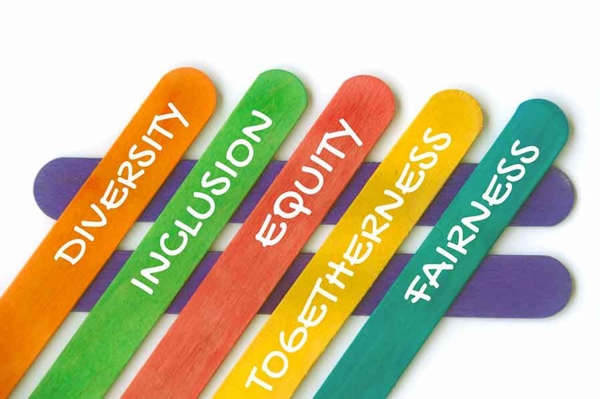
While diversity, equity and inclusion (DEI) are familiar terms or practices, the DEI landscape of America is forever evolving. Based on current issues, people continue to march in the streets for equal and fair treatment and the right to fully participate in all that life has to offer regardless of who they are. The national Cooperative Extension System is also changing and expanding its outreach to people and communities that have not traditionally benefitted from its educational programs or services. The Alabama Cooperative Extension System (Alabama Extension), for example, has made DEI a goal in its 2022-2026 Strategic Plan: Extending Knowledge, Improving Lives.
Hispanic audiences
One thing Alabama Extension at Alabama A&M University (AAMU) is doing well regarding DEI is reaching Hispanic audiences. Programs like the Expanded Food and Nutrition Education Program continue to serve Hispanic mothers and children while trained staff still teach ServSafe® certification courses in Spanish.
Inclusivity efforts
In addition, Alabama Extension at AAMU is expanding outreach by:
- Offering entrepreneurial programs in Spanish as more minorities and women become business owners.
- Using mobile vehicles to ensure that underserved students learn about diet and nutrition practices, as well as technical and scientific disciplines and occupations.
- Developing a language access plan to reach non-English speaking populations.
In the end, however, it is up to each institution to determine how to meet its DEI objectives and fulfill present-day consumer demands.
Alcorn 4-H’ers attend 2023 National 4-H Conference in Washington, D.C.

A delegation from the Alcorn State University 4-H Youth Development program attended the 2023 National 4‑H Conference held April 14-19 at the Hyatt Regency, Crystal City in Arlington, Virginia.
This conference is considered the pinnacle experience in 4‑H civic engagement, providing the opportunity for young people to connect, learn, engage, lead and impact their communities, nation and world. At the conference, delegates had the opportunity to participate in roundtable discussions and present to federal partner agencies, along with the opportunity for delegates to engage with their United States senators and representatives.
NIFA has administered the National 4-H Conference on behalf of the secretary of agriculture in Washington, D.C. since 1927. Known as “the Secretary’s Conference,” this conference is the flagship youth development opportunity of the U.S. Department of Agriculture.
The conference brings together young people, volunteer leaders, county and state Extension staff, and land-grant university faculty and administrators, as well as state and federal government officials from across the U.S. and its territories. During the conference, delegates become familiar with the government and future career opportunities and share their voices with federal agencies and congressional committees.
Youth learn life skills at CSU Extension Discovery Day Camp
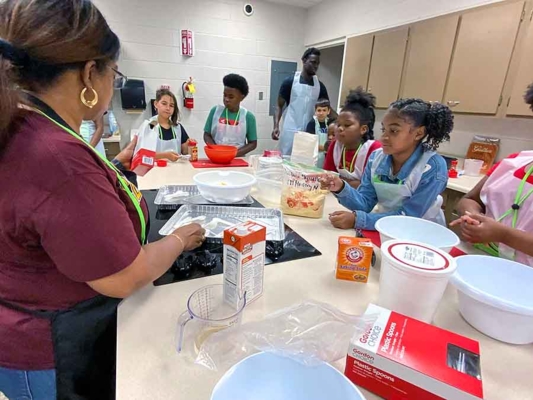
By Crystal Duckett
Central State University Extension hosted its annual 4-H Discovery Day Camp for grades 3-5 in Trotwood, Ohio, from July 10-14. The camp, one of several CSU camps held this summer, introduced more than 25 diverse youths to lifelong skills in the areas of health and wellness, science, technology, engineering, agriculture, math (STEAM) and nutrition.
Shaun Hamilton, president of the International Jump Rope Union (IJRU), shared his experiences as an international jump rope champion and helped campers understand the benefits of jump roping, not only as an outlet for physical activity but as a practical means of exploring the world through participation on a jump rope team.
“Participants were engaged in experiential engineering and environmental science activities and had the opportunity to work with other students on group projects designed to promote peer collaboration,” said Prosper Doamekpor, Central State Extension 4-H program leader. “These experiences prepare them with concrete skills they can use throughout their life.”
Students also explored the importance of making smart food choices and how poor food choices can negatively impact health. Central State researcher Pratibha Gupta, Ph.D., led healthy eating and activities workshops and taught participants key roles of vitamins, minerals and movement.
“The camp made nutrition fun by adopting a hands-on approach through activities like Kids in the Kitchen,” said 4-H leader Jodi Black. “Students acquired essential food preparation skills while enjoying snacks they prepared, such as charcuterie boards.”
And justice for all
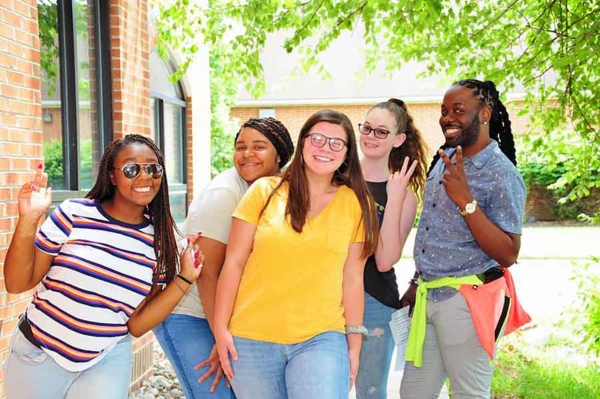
The human family includes people who represent diverse perspectives, attitudes and abilities. When we value people for their potential, we become intentional about making space at the table for them to share their unique attributes and experiences.
For the month of July, Delaware State University (DSU) spotlights Harry Thayer, a DSU alum and program leader for Cooperative Extension’s 4-H and Youth Development mission area, for his efforts to strengthen diversity and inclusion.
Thayer is a native of Brooklyn, New York. He recalls quite vividly how early experiences helped shape his worldview and laid the foundation for his current work.
FVSU, local farmer offer reusable grocery bags for underserved communities
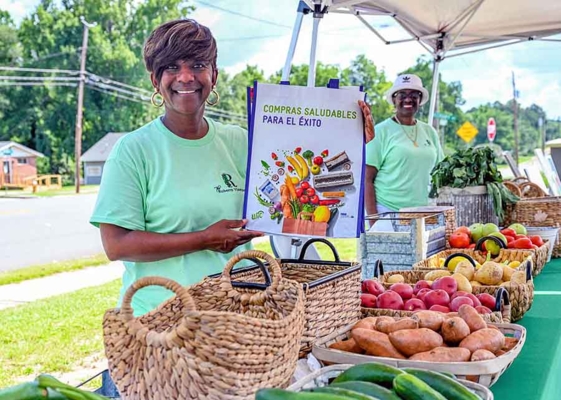
Fort Valley State University’s Cooperative Extension Program partnered with local farmer Darlene Williams Roberts, owner of Roberts Vineyard, to provide diverse communities with reusable bags for their produce.
“As a farmer, I wanted to make it easier for residents to have beautiful bags with nutritional points that they can take to the grocery store for shopping purposes,” Roberts said. “They appreciate receiving them.” She noted that the nutritional information on the bags is written in both English and Spanish to encourage citizens to eat healthier meals.
In addition to the bags, the Byron, Georgia, farmer provides fresh produce with other area farmers at different farmers markets in middle Georgia. She recently gave away fruits and vegetables at the Crawford County Health Department Women, Infants and Children (WIC) Office in Roberta.
Roberts and FVSU have distributed more than 5,000 bags over the course of three years in various Georgia counties, including Twiggs, Jasper, Peach and Baldwin.
Oklahoma land-grant universities coming together: A multicultural showcase
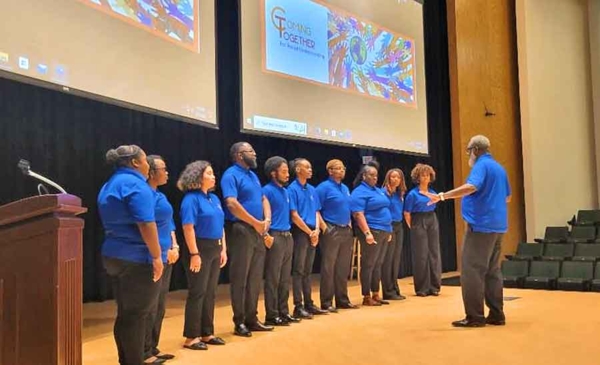
The Oklahoma Coming Together cohort consists of Cooperative Extension departments from Langston University (LU-CEOP), Oklahoma State University (OSU) and College of Muscogee Nation (CMN).
“The Coming Together Multicultural Showcase held was created by one of three action team committees tasked to provide opportunities for people to learn about other cultures, build relationships and bring awareness to diversity, equity and inclusion through a variety of avenues,” said Diana Romano, associate state Extension specialist at OSU.
A two-hour event was hosted at OSU’s Student Union and featured each of the land-grant universities sharing their land-grant history, presenting a cultural food video and providing an artistic performance. The three unique cultures featured at the multicultural showcase were First Americans, African Americans and Hispanic/Latinx. Open invitations were extended to each campus and their local community. The event was well attended with more than 100 people from across the three land-grant areas.
Coming Together is a national Cooperative Extension initiative focused on bringing people together across race and ethnicity to increase understanding about issues related to race and racism, as well as working together for meaningful change. The goal after participating in some internal work with Extension colleagues is to expand community dialogues and assist them with developing action plans to address pressing issues in their communities.
Jesup Wagon 2.0 strengthens diversity, equity, inclusion for Missouri farmers, ranchers
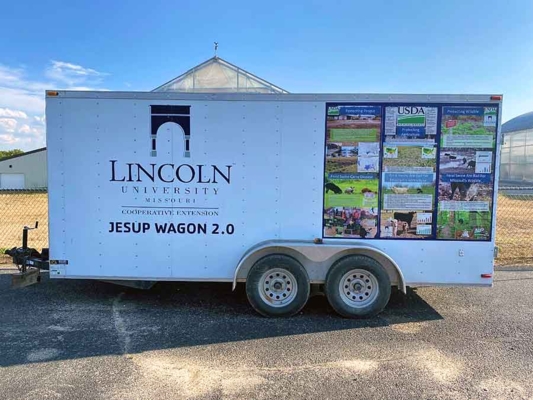
George Washington Carver wanted farmers to have the knowledge and skills they needed to make money and feed their families. In 1906, he dreamed of a moveable school and found an investor to back the idea of educating farmers in their fields. Named in honor of a New York investor, the Jesup Wagon was born.
The Missouri AgrAbility Project and Lincoln University Innovative Small Farmers Outreach Program continue the tradition of the moveable school with the Jesup Wagon 2.0 (JW2) for Missouri Farmers and Ranchers. The JW2 shares tools to build high tunnels, livestock handling equipment, hand tools and specialty tools, as well as emerging technology, bringing modern innovations to small farmers in the same manner and spirit that George Washington Carver was able to do more than a century ago.
Many farmers and ranchers of diverse age groups with a range of skills have had the opportunity to try out agricultural ergonomic tools and safety equipment and pick up resources, brochures and materials to fulfill their educational needs.
N.C. A&T Extension’s Community Voices program trains grassroots leaders, problem solvers
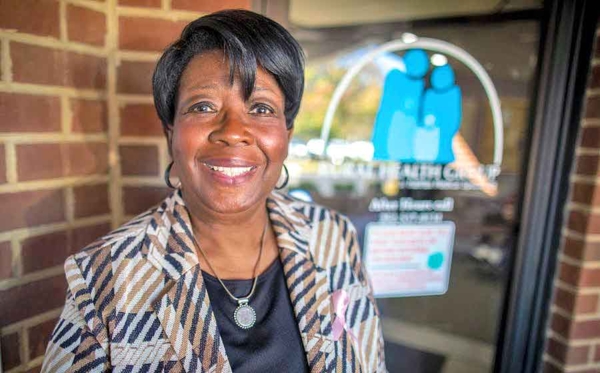
Patricia Peele likes to quote poet and civil rights activist Maya Angelou when she talks about the value of Community Voices, an Extension at A&T program to help citizens develop into community leaders.
“When you know better, you do better,” said Peele, quoting Angelou.
“It’s about giving people the confidence they need to take the steps toward making change,” she continued. “A lot of people have the desire to help their community, but they are reluctant because they have no knowledge, no tools. This training gives them confidence and teaches them what leadership is all about.”
Community Voices is a grassroots leadership training program offered in four modules aimed at limited-resource and other non-traditional leaders and organizations. Participants learn to solve community problems through hands-on learning that teaches problem-solving strategies, developing a shared vision and communication skills. The course also helps participants understand the structure of local governments and nonprofit organizations, so they can work with them to address mutual concerns.
“More than anything, Community Voices helps you develop a support system,” said Belinda Jones Hill, coordinator of the Roanoke Valley Breast Cancer Coalition and a graduate of the program.
Creating meaningful access
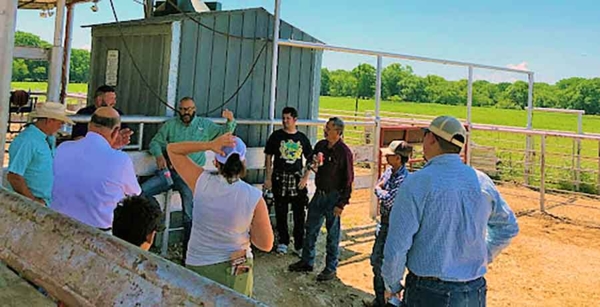
Prairie View A&M University’s Cooperative Extension Program (CEP) is rapidly making progress in meeting the needs of its diverse Texas audience.
Project Monarch, a pilot project implemented by Limited English Proficiency Program Coordinator Ashia Williams, aims to streamline processes for requesting and receiving translation and interpretation support for CEP programs, services and activities and to train employees in the basics of language access and cultural diversity.
Thanks to the pilot team’s efforts, CEP held its first all-Spanish beef cattle clinic on Friday, June 9. Braxton Mitchell, Wharton County Extension agent, hosted the event at the world-class J.D. Hudgins Ranch in Hungerford, Texas. Joseph Romeo Ozuna, Extension agent for Starr and Hidalgo counties, and PVAMU Research Veterinarian Juan Romano, DVM, MS, Ph.D., served as featured speakers.
Program attendees learned how to interpret traits in calves, determine if a bull is fertile and best practices for artificial insemination management. Additionally, a U.S. Department of Agriculture representative spoke about further support available to community members. The presentations were conducted in Spanish, and supporting materials were also available in Spanish.
We are excited to see our vision come to life as we continue to work toward creating meaningful access for our current and future linguistically underserved program participants.
SC State 1890 Extension strengthens race relations at Coming Together for Racial Understanding workshop
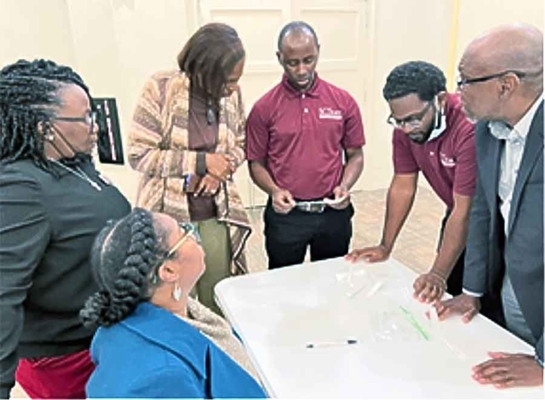
South Carolina State University 1890 Research & Extension aims to help bridge racial divides and strengthen race relations in the communities its programs serve by initiating conversations between community members and leaders.
Earlier this year, the Low Country region hosted Coming Together for Racial Understanding, a workshop in which nearly two dozen community representatives from Allendale, Beaufort, Colleton, Hampton and Jasper counties participated in interactive dialogues centered around understanding racial differences and developing pathways that lead to transformational and sustainable change.
“My intention for coordinating this workshop was to bring awareness to the importance of the role race relations play in our communities,” said Cornelius Hamilton, SC State 1890 Extension Low Country regional director. “We targeted leaders and actively involved citizens because they are serving the public in various capacities in grassroots organizations and have the potential to impact social dynamics in the communities they serve," Hamilton continued.
During the workshop, industry leaders guided the group through a series of topics focused on understanding implicit biases, improving equality in soft-skill job training and generational/financial wealth-building. This workshop also identified current efforts that were taking place in communities and action plans for future efforts to address the issues of racial injustice and inequalities. For more information, contact Hamilton at chamilt3@scsu.edu.
Extension’s community learning, service programs can positively impact diversity, inclusion efforts

The U.S. Census projects the world’s population to reach 10 billion people in 2050. With this growing population, the need for an agricultural paradigm shift is critical.
As we prepare for a growing future, Extension must remain at the apex of community learning and service. Extension programs must continue to transfer new knowledge and information that empower farmers, ranchers and communities to not only realize but clarify their goals.
How will this be achieved in combination with the need to further diversify and make everything Extension stands for more equitable? We must continue to prepare leaders and grow the capacity of more Extension professionals to serve wisely, skillfully and with greater vision and courage. Without diverse and inclusive Extension programs, adaptation and survival will be difficult to achieve.
Confluence events demand a need for positive change in our world. We must create new systems and structures to serve the needs of all we live, learn and grow with. This will require a transformation of our Extension institutions and services, and it begins with a transformation of our thinking. This paradigm means new knowledge, new tools and an entirely new level of courage if we are to succeed.
For information about the Southern University Ag Center’s Office of Equity, Diversity, Inclusion and Title IX, contact Dr. Donovan Segura at donovan_segura@suagcenter.com.
TSU College of Agriculture awarded $18M grant from USDA
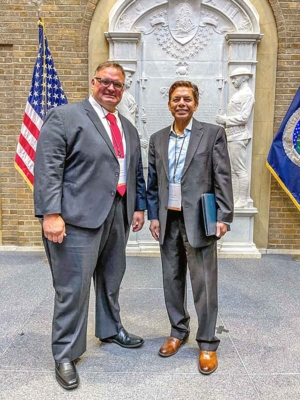
Tennessee State University’s (TSU) College of Agriculture was awarded an $18 million grant from the U.S. Department of Agriculture (USDA) National Institute of Food and Agriculture (NIFA).
“This is a game changer for Tennessee State and further enhances our stellar reputation as a premier land-grant institution with one of the top agriculture programs in the country,” said TSU President Glenda Glover.
“We are quite excited with this announcement by USDA Secretary Vilsack that the TSU College of Agriculture will receive $18 million to cultivate the next generation of agricultural graduates,” said Dr. Chandra Reddy, TSU’s dean of agriculture.
TSU’s project entitled “NEXTGENeration Inclusion Consortium for Building the Food, Agriculture, Natural Resources and Human Sciences Pipeline (FANHP)” is led by Dr. John C. Ricketts, who is a professor in the Department of Agricultural Sciences at TSU.
“This project will establish an inclusive consortium of institutions to build and sustain the future of the workforce in food, agriculture, natural resources and human sciences,” said Ricketts. “Through this project, TSU and our partners will be able to advance equity in this workforce for future generations.”
CISC Dialogue Model provides strength in diversity, inclusion
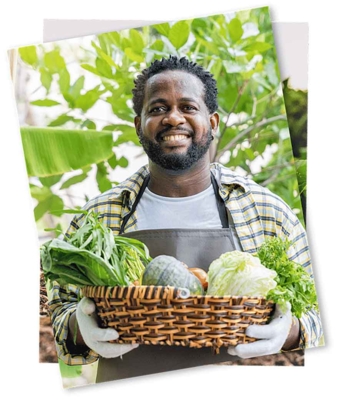
The Carver Integrative Sustainability Center (CISC) launched a dialogue series called “Black Harvest,” led by Dr. Lindsey Lunsford, assistant professor for food systems education and policy at Tuskegee University Cooperative Extension. This series makes it easier for partners to talk with Extension staff to express their issues and concerns. It was created after a host of conversations with Black producers and individuals in the Black Belt communities of Alabama.
In conjunction with Lunsford, Natilee McGruder-Kyle, J.D. of Growing Green LLC, developed the dialogue series. After the initial dialogue, there were a few takeaways.
- Innovative applications like racial affinity caucusing, breathing techniques, journaling and graphic notetaking.
- Facilitating best practices such as creating a welcoming environment (music, food, prizes and decorations), group breakouts, harvesting ideas and reporting back.
Equity budgeting and investing in the local economy (food, helper, artist, DJ, etc.).
Lunsford is also working with The Ohio State University Extension on “Project DREAMS” in developing a curriculum using portions of the CISC Dialogue Model to work with the National 4-H. After working with partners to put on Equity Day in February, which included dialogue with young people from different cultural and racial backgrounds, the participants were able to examine racial (in)equity in their school and community.
All the work that has been done by Lunsford and the CISC team will be published in the 4-H Equity Playbook and in the Professional Ag Workers Journal (PAWJ) Black Harvest Special Issue. For more information, contact Lunsford at llunsford@tuskegee.edu.
UAPB alumnus introduces high school students to field of aquaculture/fisheries
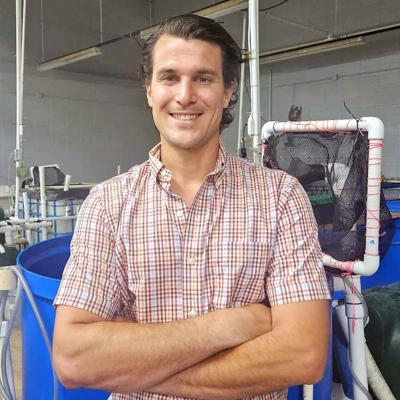
Ignacio Lopez, a 2016 alumnus of the graduate program in aquaculture and fisheries at the University of Arkansas at Pine Bluff (UAPB), strives to show high school students their self-worth and instill them with skills that will be valuable in their future careers.
As an aquaculture instructor for Moss Point Career and Tech Ed Center, a public high school in Moss Point, Mississippi, he is responsible for introducing students to the field of aquaculture and fisheries and showing them how to construct and maintain aquafarms.
In addition to helping increase awareness of aquaculture among high school students in Moss Point, Lopez also helped facilitate a special one-day high school visit to the U.S. Aquaculture Society’s recent Aquaculture America meeting. For the second year in a row, UAPB participated in the diversity, equity and inclusion session to help ensure inclusivity in the field and in the U.S. Aquaculture Society.
During the conference, groups of high school students from Louisiana and Mississippi had the chance to interact with aquaculture professionals and learn about career opportunities in the field. According to Dr. Rebecca Lochmann, chair of the Department of Aquaculture and Fisheries at UAPB (currently on sabbatical), this is an important step by the U.S. Aquaculture Society in exposing young minority students to aquaculture.
In working with youths, Lopez said he believes there is a capable individual inside everyone, regardless of sex or demographic.
4-H STEM team enriches underserved youth summer programs

Summer presents an opportunity across the nation to give at-risk and underserved youths a leg up through camps organized by educational institutions and nonprofit agencies. The University of Maryland Eastern Shore (UMES) Extension 4-H STEM is joining the effort by providing enriching science outreach to youths aged 5-18 across the Delmarva region as they gather for day camps and other short-term summer programs.
“Our team’s mission is to provide high-quality, hands-on STEM experiences by partnering with community organizations and schools, especially those that work in underserved communities,” said Ariel Clay, a 4-H youth development STEM specialist with UMES Extension.
4-H STEM team members, Clay said, are major contributors to the university’s Upward Bound program, a six-week summer program for high school students. The team’s robotics expert will show the teens how to construct, program and operate small robots in a weekly session, while another will focus on college and career readiness.
Another major partnership is with Horizons Delmarva, an area nonprofit organization that provides educational opportunities for low-income youths in Wicomico and Worcester counties. The whole team will be taking turns teaching enrichment lessons for youths aged 6-11 each week ranging from stomp rockets to edible insects to community gardening. Recreation and Parks day camps operated by counties across the Lower Shore will also benefit from an agent’s specialty in environmental science and marine ecology.
Small Farm Outreach Program helps Hispanic farmers thrive
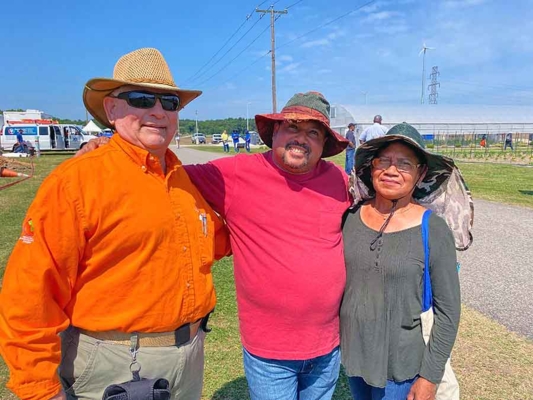
As the Commonwealth of Virginia welcomes increasing numbers of residents of diverse ethnicities, the Hispanic population, in particular, continues to soar — and so do their needs for Extension services.
Of this population, there are those who want to start their own farm enterprises. To assist them, the Small Farm Outreach Program (SFOP), part of the Virginia Cooperative Extension program at Virginia State University, relies heavily on Leonel Castillo, its Hispanic outreach coordinator.
“The Hispanic farmers I work with in Virginia have different beginnings,” said Castillo.
Some came to Virginia as farm workers, ranchers or construction workers, while others married women who loved gardening. Some started small farms as an investment after helping their wives grow the family garden. Others bought produce and resold it for a profit before starting a farm operation. Whether or not they already had farming and ranching experience, they all had the desire to farm but often lack the resources to succeed.
SFOP helps bridge the gap so Hispanic farmers can thrive. Castillo is building relationships and providing information in Spanish to help address the barriers in communications and access to capital and land and to build trust.
Virginia Cooperative Extension extends the resources of Virginia's two land-grant universities, Virginia State University and Virginia Tech, to solve problems facing Virginians every day.
WVSU 4-H teams up with WVU to host water quality summer camp
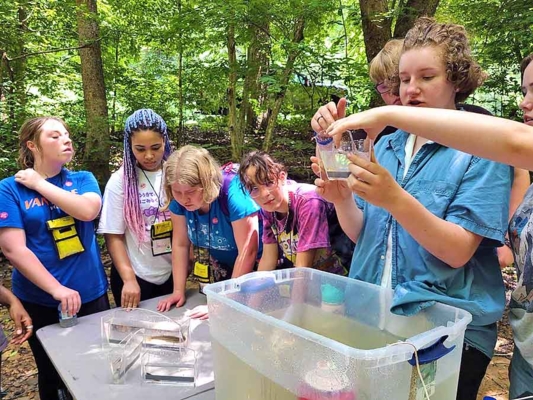
West Virginia State University (WVSU) 4-H and WVSU Extension Service have partnered with West Virginia University’s Health Sciences and Technology Academy (HSTA) to host the Yellow Jacket Water Quality Summer Camp.
The week-long program focuses on water quality and runs from July 16-21 and will combine academic classes, hands-on activities and leadership opportunities in the evenings. Topics will include water quality metrics, investigating water contamination, dose versus poison levels and eutrophication and heavy metals.
HSTA is a one-of-a-kind mentoring program in West Virginia that helps underrepresented high school students enter and succeed in STEM-based undergraduate and graduate degree programs. HSTA students are primarily those who have grown up in rural communities and are the first in their families to attend college. Additionally, over half are financially disadvantaged and one-third are African American. Most HSTA graduates obtain a college education and other advanced degrees.
In this camp, the gender split is overwhelmingly female with additional non-binary representation. There are 39 females, 14 males and one non-binary participant. These statistics show potential promise for increasing the number of women and others in STEM while impacting underrepresented youths.
